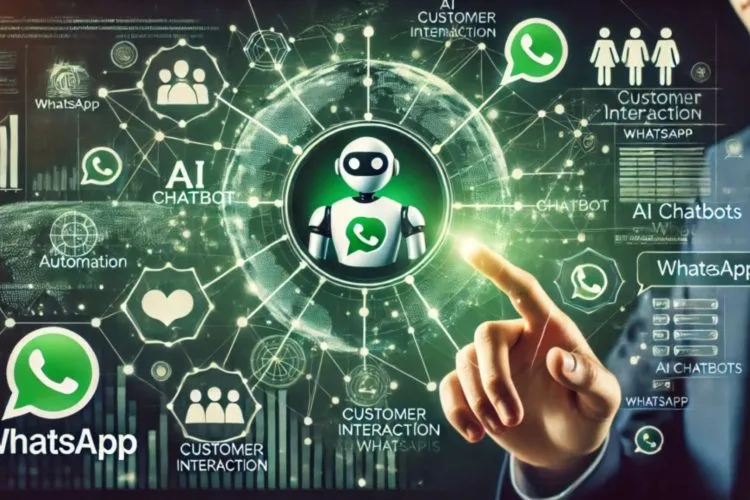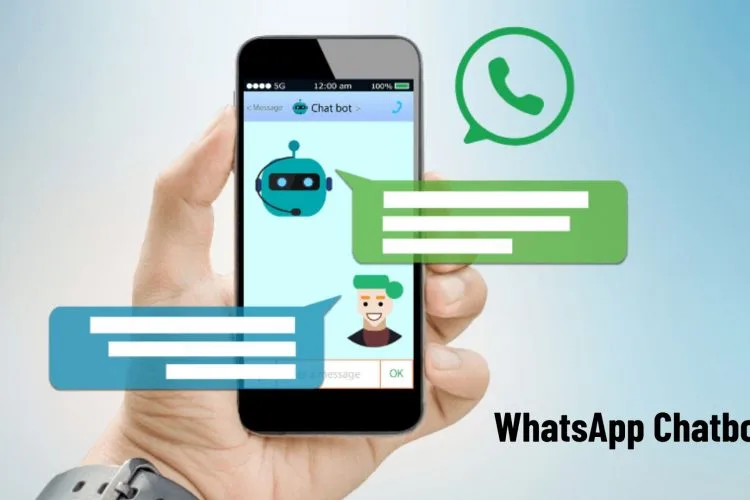
In the digital world advancing at breakneck speed, the customer engagement tech stack is changing at a speed not seen before, particularly in how brands engage their audience. Long conversations on the phone are being first reduced and later eliminated; slow responses on email are diminishing; organizations that do not have a proper organizational viewpoint are going down.
With this cutthroat competition, it is now the norm for new-age businesses to stay open 24/7, answer customer queries in seconds, talk straight, and speak to their customers very personally. This is where the WhatsApp AI chatbot enters the scene, a true game-changer as to how businesses interact with their customers and set new standards for convenience, speed, and client satisfaction in the digital world.
With more than 2 billion active users worldwide, WhatsApp is one of the most frequently used messenger apps, making it the best channel for connecting businesses with audiences. This blog will examine why WhatsApp is essential for customer engagement and how AI is changing this domain. We will also hear real examples of success stories showcasing the power of WhatsApp AI chatbots.
Why Choose WhatsApp?
There is no doubt it is the leading communication app by billions all over the world, spanning across different countries and regions. Companies of all sizes, from small and startup ventures to massive multinational corporations, are slowly recognizing the WhatsApp API in India.
Today, this powerful tool is speeding toward being the go-to of India and the rest of the world for businesses looking to close the gap in connectivity with their clients. Based on WhatsApp, integrated into its customer engagement program, a business stands to uplift its service, build relationships, and provide the new-age consumer with long-cherished opportunities for seamless experiences. And these are the reasons:
1. Massive User Base
WhatsApp boasts over 2 billion active users worldwide, with a significant percentage of its user base coming from India. The app has emerged as an important channel for any business seeking to expand its scope and serve extended profits in every direction, extending access to consumers from any industry, be it retail, financial services, or health care.
2. Easy to Use and Trust-inspiring Platform
Unlike some other customer support channels, specific familiarity or trust in WhatsApp has rendered it easily familiar to users. Touching on it, most users have communicated through WhatsApp long before any contact with friends and relatives. This essentially brings down the barrier of communication for any business undertaking.
3. One-To-One Communication
WhatsApp allows businesses to respond to customer queries in real-time. Integration of the WhatsApp AI chatbot can help companies to provide solutions on the go without needing human intervention, thus enriching the experiences of its users.
4. Media Rich
WhatsApp is not strictly limited to message-based interactions; it allows for sharing images, videos, voice messages, and even documents. Such features could be capitalized on in creating rich and interactive conversations and would, therefore, command much engagement from customers.
How AI is Changing the Game
These days, customer engagement tactics are becoming progressively reliant on AI-supported solutions and automation. In India, AI chatbots integrate with the WhatsApp API to provide fast, accurate, and highly personalized responses at scale while providing uniform support and engagement for customers in every time zone. Here’s how AI is breaking this framework:
1. Natural Language Processing (NLP)
From a few years ago to the present, AI chatbots can analyze and take input from human language; it is undoubtedly much more conversational. NLP enabled the chatbot to understand the contextual basis, colloquial leanings, and even dialects, thereby making it feasible for customers to receive relevant answers each time.
2. Personalized Customer Experiences
Gone are the days of generic replies to consumer issues. AI chatbots analyze consumer data and behavior to provide solutions tailored to a particular customer. A WhatsApp AI chatbot can offer product suggestions based on previous purchases or user preferences for an e-commerce platform.
3. Automated Customer Support
AI chatbots can deal with repetitive inquiries regarding order tracking, appointment scheduling, and FAQs without human participation. This translates into reduced operational costs and gives more opportunity for human agents to apply their skills to resolve more complex customer problems.
4. Engagement Predictive
AI is not merely responsive; it is preemptive. Such predictive analytics ensure that AI chatbots can foresee the needs of customers, supplying solutions before they are even needed. A bot could also remind customers their subscription is nearing the end or provide recommendations for similar upgrades.
5. Seamless Integration with CRM Systems
AI chatbots connect to a CRM system to keep the customer database up to date and subsequently allow for a seamless experience across various touch points.
Real-World Success Stories
A few companies across a wide range of fields have WhatsApp AI chatbots as a critical pillar for their digital transformation strategies. These bots enrich company customer engagement strategies and build more personal interactions that ultimately enhance customer satisfaction, loyalty, and operating efficiency. Here we take a glance at a couple of real-life case examples:
1. E-commerce: Personalized Shopping Assistant
A prominent e-commerce brand in India embedded a WhatsApp AI chatbot to ensure personalized product recommendations, order tracking, and instant customer support. The use of the WhatsApp API in India shortened response time and increased overall customer satisfaction by 40%.
2. Banking and Finance: Instant Customer Support
A significant financial institution set out to implement its WhatsApp AI chatbot, helping customers with balance inquiries, fund transfers, and real-time updates on their loan application status. AI’s response capability minimizes the customer’s waiting time while improving user experience.
3. Healthcare: Appointment Scheduling and Notifications
A healthcare provider adopted a WhatsApp AI chatbot to assist patients in booking appointments, sending reminders about them, and even providing them with health tips. Engaging patients increased, and cancellations of visits were reduced by 30%.
4. Travel and Hospitality: Real-Time Updates
One of the largest airline companies in the industry created its WhatsApp AI bot to procure real-time updates on flights, provide responses to general inquiries, and assist customers with new bookings. This optimized the customer’s traveling experience and relieved some pressure from customer support teams.
Conclusion
AI chatbots are the future for instant, individualized text and voice customer feedback on WhatsApp, and they serve various purposes to address the consumer’s concerns. Chatbots are increasingly gaining traction as the most valued strength and a market differentiator, especially with any progressive organization. Be it a small entrepreneur or a mammoth corporation serving millions of users, having WhatsApp AI Chatbot in place will surely open up an advantage and lead you to stay ahead of the competition to meet new-age consumer demands. Embracing these technologies will enable businesses to provide a real-time response, thus improving customer satisfaction and solidifying the client relationship.
Radiance Solutions stands ready to assist you with establishing an AI-based WhatsApp chatbot or activating a WhatsApp API in India for business. We will devise a detailed chatbot strategy that resonates with your business goals. Give us a call for any further information!




